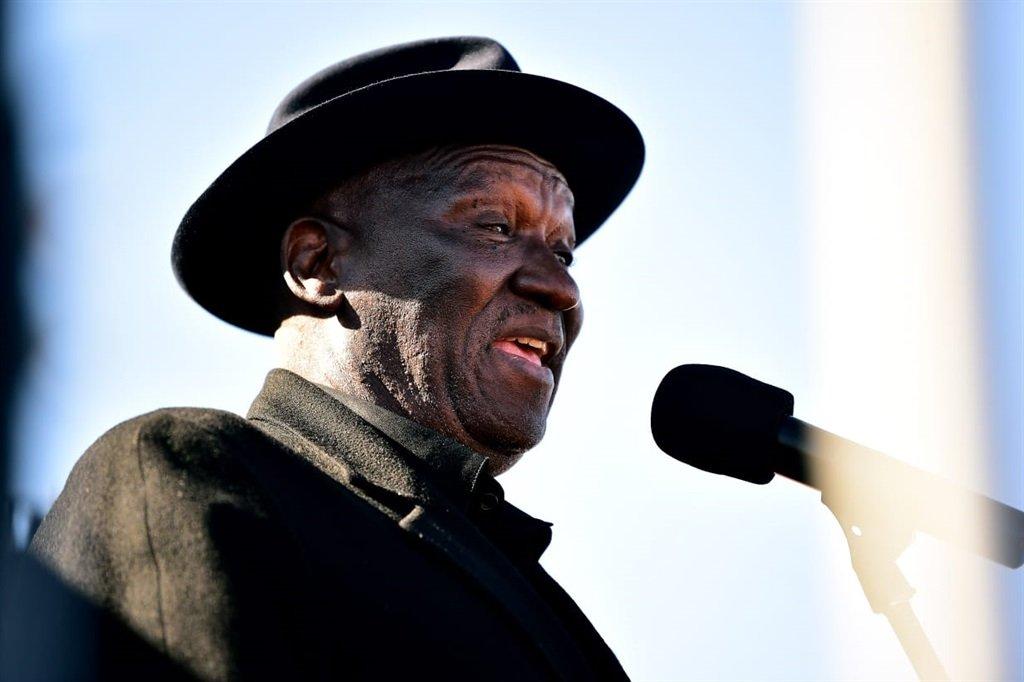Africa-Press – South-Africa. Police Minister Bheki Cele received a hero’s welcome in Khayelitsha, Cape Town on Monday, singing, joking, and in a long off-the cuff speech, cast the net of responsibility for crime further than the officers in a patrolling police bakkie.
Fresh from his commiseration visit to Alexandra, Johannesburg on Sunday, after a shooting spree in the township, Cele arrived at the Desmond Tutu community hall in Makhaza, Cape Town to Gloria Gaynor’s I will Survive, belted out for him by the police band.
A praise poet spoke words of tribute to him and the late Nelson Mandela as the country marked the birthday of South Africa’s first democratically elected president.
With Khayelitsha being an ANC stronghold, the audience was respectful to him, but frustrated and angry about their living conditions.
“We are people, we are not animals,” said one man during the roving mic opportunity for statements.
He said:
For residents of the sprawling Makhaza on the eastern edge of Khayelitsha, there was severe frustration about only having a mobile police station, no free replacement shacks after fires, and no stipends for volunteer patrollers.
They lived not just with crime, but with potholes, and not even an address to help others locate their homes.
There was a complaint that with only one mobile police station, residents had to travel as far as Harare police station. Sometimes it was closed because of load shedding, although this was denied, with a fact-finding visit to Harare to check.
The road leading to the hall where the meeting was held had no functioning traffic lights, so drivers raced through intersections, too afraid to stop in case they were hijacked. The smell of sewage spills was hanging heavily in the air, with toilet paper floating in the waste water on the ground.
On top of that, residents said constant load shedding was turning Makhaza into a haven for crime, with one crime patrol volunteer explaining that they couldn’t even see their hands in front of them while patrolling during load shedding at night.
Khayelitsha Development Forum chairperson Ndithini Tyhido said shacks were built so closely together that he had to pull his tummy in to get through some of the alleys. And many of these narrow alleys lead to dead ends in the dark.
Backed up by his deputy, Cassel Mathale, and police top brass, there were no signs of the anger that made Cele scream “shut up” repeatedly at anti-crime lobbyist Ian Cameron in Gugulethu recently.
When Cele went to the perspex podium on Monday, before launching into his speech, he asked: “Waar was jy? (Where were you?)”, and sang a quavering rendition of Shosholoza Mandela with the meeting’s participants.
Without mentioning Cameron, he touched briefly on the “shut up” incident by saying each person was entitled to their history.
“The crux of the matter is, it happened,” said Cele. He added that he was indeed among the young activists kicking up the dust with protests in Khayelitsha, which he called a “dumping ground” during forced removals.
It was this legacy and subsequent slow development that caused the situation residents found themselves in today, he said.
But no sooner had Cele encouraged everyone to work together to find new ways of fighting crime, than he launched a sudden attack on the Western Cape’s proposal that policing powers be devolved to the province.
“There is nothing called provincial police,” said Cele, with Western Cape Police Oversight and Community Safety MEC Reagen Allen at the table next to him.
He said:
“I’m saying you are crying [at] the wrong funeral,” said Cele.
“I can’t be a constitutional delinquent.”
At that point, Allen interrupted and made some brief off-mic comments to Cele.
Asked afterwards what he had told Cele, Allen said he explained that in the Western Cape government’s view, constitutional provisions read with the SA Police Service Act allowed for devolution.
Cele then blamed the media for not highlighting their successes, saying they were quick to camp out at the houses of crime victims in the early stages of an investigation, but were nowhere when arrests were made.
He said the remarkable rescue of a kidnapped Parow construction company owner, just as “around R25m” was about to be handed over by his family, got little coverage when he was found and freed in Makhaza.
Cele said he planned to have a word with Justice Minister Ronald Lamola over the granting of bail and parole to people who should not get it.
He said bail was so commonplace that after the recent arrest of Yanga “Bara” Nyalara, the prosecution, police and magistracy decided not to take him to court in Khayelitsha, because it had a reputation of being a place offering “wholesale bail”. Instead, Nyalara was taken to the Cape Town Magistrate’s Court.
Cele said:
The Nyalara arrest was a particularly significant breakthrough after more than a year of bodies being strewn in the streets of Khayelitsha by a suspected extortion racket.
However, the arrest of Nyalara did not bring the police instant relief. A spate of mass shootings occurred elsewhere in the country, although national police commissioner Fanie Masemola felt there was no link between them.
He questioned why local liquor authorities were not doing their job correctly and why spot checks were not being carried out on foreign-owned spaza shops.
Women, however, were given a break from criticism.
“These women have no tools to rape,” he said. “[The] tools of rape are with the men,” he continued.
He said if men stopped raping, there would be no rape.
Cele added:
The residents of Makhaza left with some hope though. They were promised a new police station in a park home by 1 November, and the repeated pleas for a stipend for the volunteer community patrollers would be considered. Eighty-five police officers would also be moved from “affluent” areas to help fight crime. A youth summit is also in the works.
For More News And Analysis About South-Africa Follow Africa-Press






